Event
[Event Report] GHIT Fund’s Participation in TICAD 9
The Ninth Tokyo International Conference on African Development (TICAD 9), held from August 20 to 22, 2025 in Yokohama, Japan, convened global leaders to accelerate development across Africa, with a strong emphasis on health, technology, and international partnership. At this significant forum, the GHIT Fund hosted and participated in nine different thematic events, engaging diverse stakeholders—including government officials, international organizations, researchers, and industry experts—to drive progress in health innovation and equity throughout Africa.
Over the three-day conference, GHIT Fund actively engaged with more than 500 participants, including key Japanese policymakers and African leaders, facilitating knowledge exchange and collaboration across borders. Notably, approximately 15% of all side events centered on global health issues, underscoring the importance of health innovation at TICAD 9. Through these thematic events and the interactive exhibition booth, GHIT Fund advanced international dialogue and forged new partnerships to promote access to innovative healthcare solutions for underserved populations. The following report details the Fund’s contributions, key outcomes, and future directions arising from this active involvement at TICAD 9.
The Future of Health Technology Innovation and Equity
On August 20, GHIT Fund, United Nations Development Programme (UNDP), and Access and Delivery Partnership (ADP) co-hosted a strategic seminar addressing health technology innovation and equitable access, sponsored by the Ministry of Foreign Affairs of Japan and the Ministry of Health, Labour and Welfare of Japan. The gathering brought together a diverse array of stakeholders including Japanese member of parliament, UN leadership, pharmaceutical industry executives, African regulatory officials, university researchers, and diplomatic representatives, notably including Keizo Takemi, Former Minister of Health, Labour and Welfare, Japan, and H.E. Ryo Nakamura, Ambassador and Assistant Minister/Director-General for Global Issues, Ministry of Foreign Affairs of Japan.
The event centered on strengthening innovation pathways while ensuring equitable access to advance universal health coverage, pandemic preparedness, and global health equity. Key themes emerged around the critical need for strategic partnerships in building resilient health systems and delivering drugs, vaccines, and diagnostics for underserved populations.
A central panel on Advancing Equitable Health Technology R&D in the Digital Age explored synergies between R&D and access mechanisms. Discussions emphasized aligning African research capabilities, regulatory harmonization, digital innovation, and partnership structures to deliver health technologies both swiftly and equitably. Speakers stressed that access considerations must be integrated from the earliest stages of innovation rather than treated as an afterthought. The Uniting Efforts for Innovation Access and Delivery, a partnership of the Government of Japan, the UNDP-led ADP, and the GHIT Fund established in 2019, was highlighted as a model for this integrated approach. Participants called for inclusive funding partnerships, clearer business models to bridge research gaps, and process innovations enabling parallel product testing.
In an era of uncertain global health funding, Hayato Urabe, GHIT Fund’s Associate Vice President of Investment for Impact, advocated for building "anti-fragile systems that not only withstand stress but emerge stronger from it."
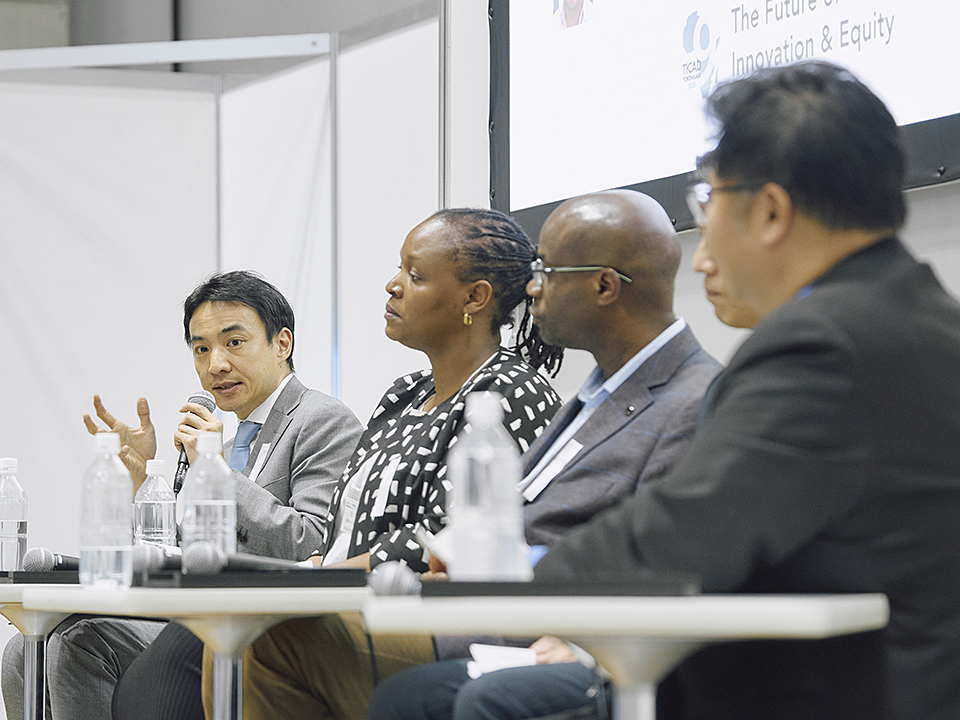
Co-Creating the Future of Healthcare and the Economy
On August 20, Cabinet Office and Cabinet Secretariat, Government of Japan hosted an event showcasing Japanese contributions to Africa's healthcare through public-private partnerships. The gathering featured Minister of State for Healthcare Policy from Japan, ministers and government representatives from four African countries, and executives from the International Finance Corporation, African Development Bank, and Keidanren. The event highlighted Memorandums of Understanding and Collaborations in the African Healthcare Sector, demonstrating progress under Japan's Africa Health and Wellbeing Initiative (AfHWIN) launched at TICAD 7.Government representatives from African countries presented concrete outcomes from Japanese investments: local medical supply production scaling in Kenya, provision of technical assistance to strengthen regional health management teams and regional referral hospital management teams, and early childhood treatment improvements in Senegal. GHIT Fund CEO Dr. Kunii concluded: “Africa, known as the Continent of Hope, and Japan, the Land of the Rising Sun, can, together, illuminate the path toward a healthier, wealthier, and more peaceful world."
Related links
■Cabinet Secretariat, Government of Japan: Event overview
■Cabinet Secretariat, Government of Japan: Result Report
■Cabinet Secretariat, Government of Japan: Annex (Presentation Slides)
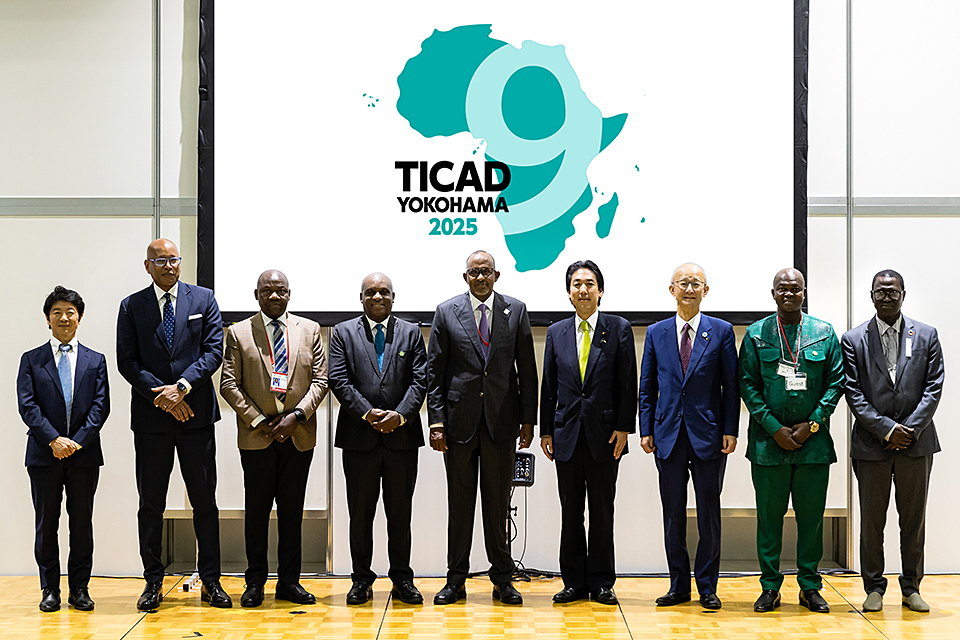
Co-Creating with Africa to End NTDs
On August 20, the TICAD 9 neglected tropical diseases (NTDs) Symposium brought together parliamentary representatives, pharmaceutical industry leaders, research organizations, youth advocates, and African clinical experts to address NTDs. The coalition was jointly organized by Nagasaki University, Japan Pharmaceutical Manufacturers Association, DNDi Japan, NTDs Youth Organization, SDGs Promise Japan, GHIT Fund, and JAGntd.
Discussions centered on bridging innovation gaps between research and delivery, highlighting DNDi's development of 13 new treatments over two decades and the need for sustainable, locally-driven healthcare systems. Dr. Kunii addressed funding challenges, noting that while NTD tool development requires over ten years and enormous resources with limited private investment incentives, opportunities exist. The session reinforced commitments to sustainable NTD strategies aligned with the Nagasaki Outcomes Statement.
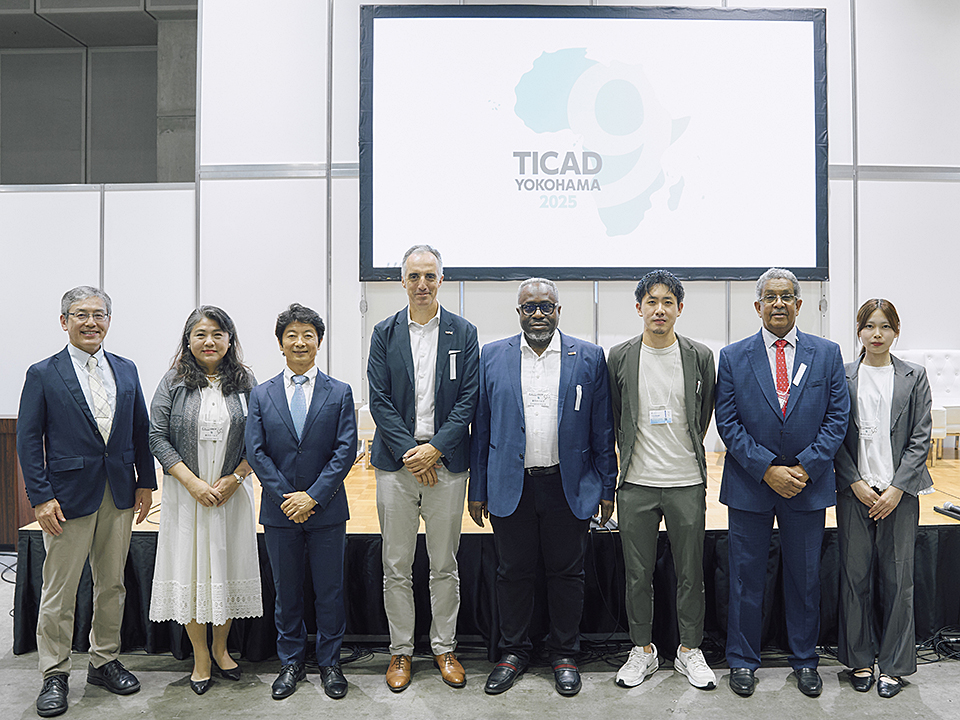
Africa-Japan Common Vision on Health: Co-creating Health Security and Sustainable Growth
On August 21, JCIE and African Union Development Agency (AUDA-NEPAD) launched the "Africa-Japan Common Vision on Health" report, featuring Kenya's Cabinet Secretary for Health, Japan's Minister of Education, Culture, Sports, Science and Technology Toshiko Abe, and a former Hideyo Noguchi Africa Prize Laureate Salim Abdool Karim.
The Common Vision establishes five action areas: (1) strengthening sustainable health financing, (2) enhancing data and diagnostics capacity, (3) promoting integrated and digitalized primary and preventive care, (4) accelerating co-led research and technology innovations, and (5) strengthening pandemic preparedness and response and health system resilience. In discussions moderated by GHIT Fund's CEO, sustainable health financing emerged as the most critical challenge, with speakers advocating progressive taxation and equitable partnerships beyond traditional donor-recipient models. Participants emphasized urgent human resource development needs in vaccine and pharmaceutical manufacturing, proposing a "scorecard" to monitor progress. Former Health Minister Keizo Takemi noted Japan-Africa cooperation has entered a new stage encompassing digitalization, innovative financing, and private sector engagement, adding that the experience of regulatory harmonization and clinical trial networks in Asia can be applied in Africa.
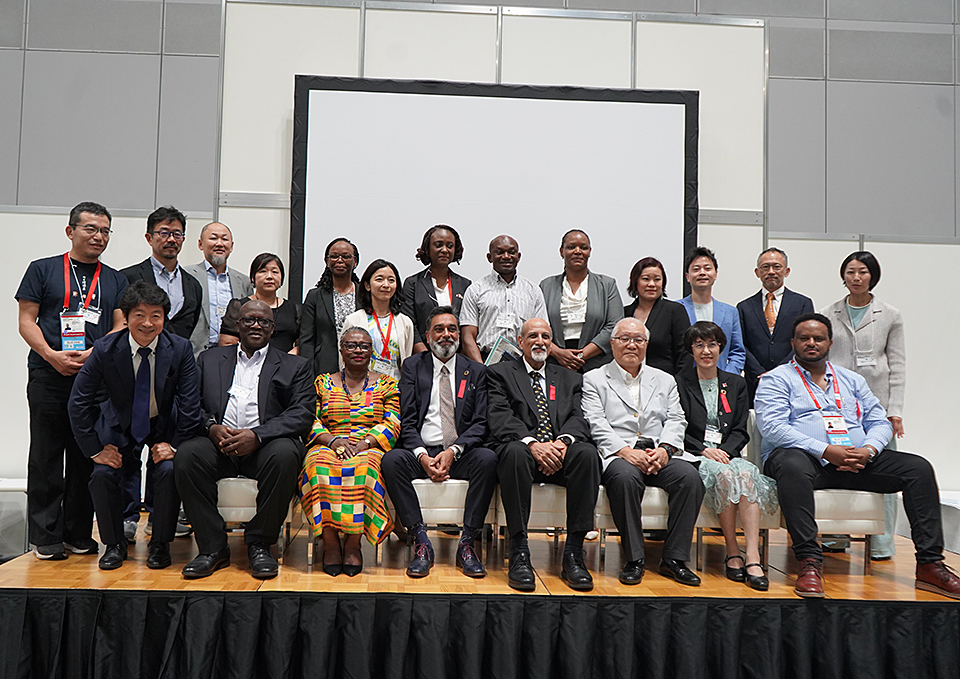
AMED Initiatives in Africa
On August 21, the Japan Agency for Medical Research and Development (AMED) showcased three major African health programs, featuring Japan's Minister of Education, Culture, Sports, Science and Technology, as well as leaders from Japanese universities, government bodies, and the Gates Foundation.
The event highlighted AMED's Clinical Research Program for developing countries, Research Program on Emerging Infectious Diseases, and the Science and Technology Research Partnership for Sustainable Development, with researchers presenting outcomes from these initiatives.
As a panelist, Dr. Kunii addressed the challenge of overcoming the treacherous gap between product development and industrialization, noting that success requires early consideration of on-the-ground needs, aligning projects with World Health Organization (WHO) strategies, and engaging industry partners from the outset. He advocated for enhanced, cross-sector collaboration among domestic and international stakeholders to ensure research outputs can be effectively scaled and applied globally, bridging the innovation-implementation divide in African healthcare.
Related links
■AMED: Event overview
Challenges in the area of diagnostics – from the humanitarian frontline
On August 21, Médecins Sans Frontières (MSF) hosted an event addressing diagnostic challenges in African countries, featuring speakers from MSF, Japan's Ministry of Foreign Affairs, WHO, African Society for Laboratory Medicine, and GHIT Fund. The discussion highlighted critical gaps in Africa's diagnostic ecosystem, where 81% of the low- and lower-middle income countries have little to no access to basic diagnostics. Speakers emphasized the need for the diagnostics adaptable to African context and designed for real-world settings, capacity building initiatives, and quality assurance mechanisms through WHO prequalification programs.
Hayato Urabe outlined GHIT Fund’s role in diagnostics development, emphasizing that "Access should not be an afterthought" and underscoring the importance of co-creation through multi-level partnerships, community, and mission alignment.
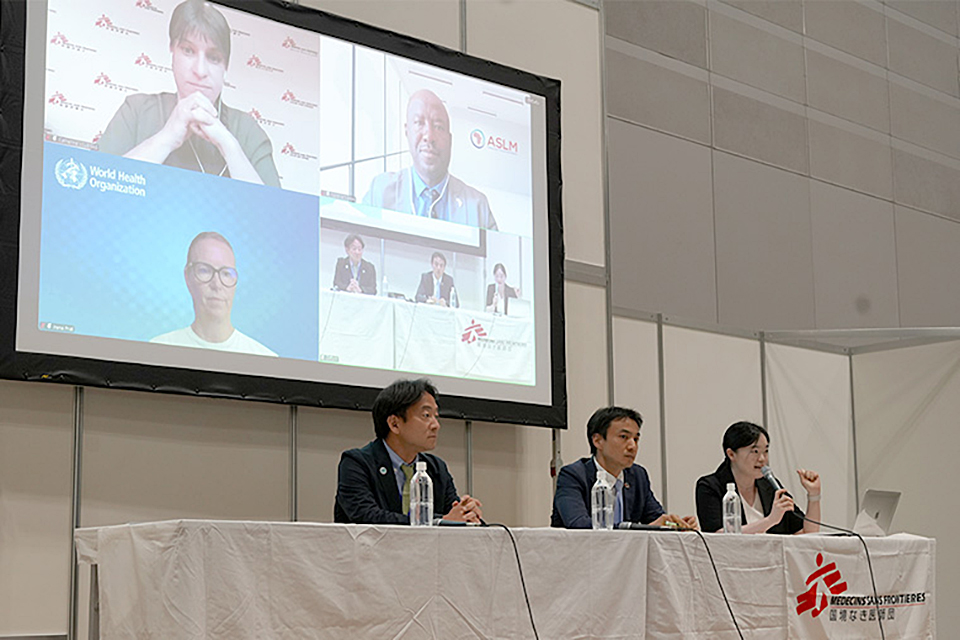
© MSF
Unlocking the Potential of Vaccine R&D and Manufacturing Capabilities in Africa
On August 22, IAVI, Japan Institute for Health Security (JIHS)/National Institute of Infectious Diseases (NIID), and GHIT Fund co-hosted an event focusing on advancing Africa's vaccine research and manufacturing capabilities. The session featured executives from VaxSen of Institute Pasteur de Dakar (IPD), Africa CDC, IAVI, and the African Vaccine Manufacturing Initiative, alongside Japanese health research leaders. Discussions emphasized maintaining momentum in African vaccine manufacturing, highlighting IAVI’s achievements in Africa and Africa's first WHO prequalified manufacturing site at IPD.
Hayato Urabe presented GHIT Fund’s vaccine investments, specifically highlighting three Africa-partnered projects: placental malaria programs with Groupe de Recherche Action en Santé (GRAS), blood stage malaria vaccines with GRAS, and transmission blocking vaccines with Centre de Recherches Médicales de Lambaréné (CERMEL). He introduced the concept of a "necklace of funders" to ensure seamless project continuity across development stages, addressing funding gaps that often derail promising vaccine initiatives. He also stressed the importance of engaging younger generations in vaccine development efforts to sustain long-term progress in African vaccine research and manufacturing capabilities.
Related links
■IAVI: Event overview
The way forward for malaria elimination: joint effort through drug development
On August 22, Medicine for Malaria Venture, Nagasaki University, and Shionogi & Co., Ltd. hosted an event on malaria elimination through collaborative drug development, featuring government officials from the Republic of Kenya, research leaders, pharmaceutical executives, and the RBM Partnership to end malaria. GHIT Fund Chair Hiroki Nakatani opened with historical context, noting that August 22nd coincidentally marked when Robert Koch departed Yokohama, highlighting Japan's drug discovery legacy through Kitasato Shibasaburo.
Speakers addressed malaria's impact beyond health, affecting productivity, education, and family economics. Key elimination barriers include biological vector changes, diverted funding, and climate change. Japanese contributions were highlighted, particularly Nagasaki University-Shionogi collaboration developing a single-dose, long-acting injectable treatment supported by the GHIT Fund. Panelists stressed the necessity of context-relevant R&D to bring Africa to the forefront through partnerships. The session reinforced that effective malaria elimination requires sustained multilateral cooperation combining research innovation with contextual understanding.
Related links
■MMV: Event overview
Connecting Stakeholders: GHIT Fund's Mission-Driven Booth at TICAD 9
GHIT Fund’s exhibition booth served as an information hub at TICAD, showcasing GHIT Fund's role as an international public-private partnership dedicated to eliminating neglected infectious diseases through global health R&D funding. Displays explained the Fund's organizational structure, mission, and activities, while visitors explored target diseases, funding scope, and application criteria. These elements reinforced GHIT Fund’s position as a key player in the global health ecosystem, demonstrating our commitment to collaborative approaches in addressing diseases that disproportionately affect the world's most vulnerable populations.
Future Outlook
The global health landscape is at a pivotal moment, with increasing recognition that addressing NTDs, malaria, and tuberculosis requires sustained international collaboration, innovative financing mechanisms, and equitable access to life-saving interventions from the earliest stages of R&D. Building on the momentum generated at TICAD 9, GHIT Fund remains steadfast in its determination to advance its strategic objectives through deepened partnerships with African institutions, Japanese industry, and international stakeholders. The Fund is committed to translating the collaborative spirit and concrete commitments witnessed during TICAD into tangible progress toward eliminating diseases that disproportionately affect the world's most vulnerable populations, ensuring that innovation and access advance hand-in-hand to create lasting impact for global health equity.
Reference link
■MOFA: TICAD 9 Official Website